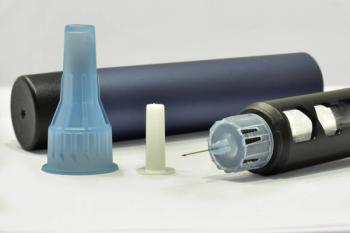
Third Ustekinumab Biosimilar Gains FDA Approval
Ustekinumab-ttwe, a biosimilar to ustekinumab (Stelara) is expected launch in the US in February 2025.
The FDA has approved ustekinumab (Stelara) biosimilar ustekinumab-ttwe (Pyzchiva) for all of the same indications as the reference medication, according to a news release.1 The drug has also been granted a provisional determination for interchangeability designation.
Ustekinumab-ttwe is available for subcutaneous injection in 45 mg/0.5 mL and 90 mg/mL pre-filled syringes, and for intravenous infusion in a 130 mg/26 mL (5 mg/mL) single-dose vial.
This is the third ustekinumab biosimilar that has received FDA approval; ustekinumab-ttwe joins
Sandoz will be commercializing the drug in the US, and anticipates launching ustekinumab-ttwe in February 2025, per the results of a settlement and license agreement with Janssen Biotech. Once launched, ustekinumab-ttwe “is expected to be among the first wave of ustekinumab biosimilars to launch in the US.”
Per the approval, ustekinumab-ttwe is approved for the same indications as Stelara, an IL-12 and IL-23 antagonist. These indications include adults with moderate to severe plaque psoriasis, active psoriatic arthritis, moderately to severely active Crohn disease, and moderately to severely active ulcerative colitis, and pediatric patients with moderate to severe plaque psoriasis and active psoriatic arthritis.
“Systemic medications like biologics are a key treatment option for many people to manage symptoms of psoriasis and psoriatic arthritis,” said Leah M. Howard, JD, president and CEO of the National Psoriasis Foundation. “Unfortunately, barriers to care, including costs, often prevent patients from getting the drug they are prescribed.
“Psoriatic disease is lifelong and chronic, leading to long-term treatment costs,” Howard continued. “Having more FDA-approved options can help make appropriate health care more affordable.”
Approval was granted to Samsung Bioepis based on a slate of evidence, including “robust clinical studies” confirming equivalent efficacy and comparable safety between ustekinumab-ttwe and ustekinimab. Samsung Bioepis entered into a development and commercialization agreement with Sandoz in September 2023.
“This approval reflects our dedication to ensuring high-quality treatments are universally acceptable,” said Claire D’Abreu-Hayling, chief scientific officer at Sandoz. “By further expanding our immunology portfolio with affordable biosimilar alternatives, we continue to make significant strides towards achieving our goal of delivering life-changing medicines to the patients who need them.”
Psoriasis, psoriatic arthritis, inflammatory bowel diseases are common; more than 8 million Americans are living with psoriasis,2 approximately 30% of whom are impacted by psoriatic arthritis.3 Inflammatory bowel diseases, which include Crohn disease and ulcerative colitis, affect 3.1 million US adults:4 more than half a million are living with Crohn disease and between 600,000 and 900,000 are living with ulcerative colitis.5 Both psoriasis and inflammatory bowel disease are chronic, systemic, immune-mediated inflammatory conditions with a lifelong relapsing-remitting course.6
The most common adverse events include nasopharyngitis, upper respiratory tract infection, injection site erythema, vulvovaginal candidiasis or mycotic infection, bronchitis, and urinary tract infection, among others. These adverse events occurred in less than 3% of patients with psoriasis, Crohn disease, or ulcerative colitis.
Patients should avoid the use of live vaccines during treatment with ustekinumab-ttwe. Cases of interstitial pneumonia, eosinophilic pneumonia, and cryptogenic organizing pneumonia have been reported with use of ustekinumab products and require appropriate treatment.
READ MORE:
References
FDA approves biosimilar Pyzchiva (ustekinumab-ttwe), to be commercialized by Sandoz in US. News release. Sandoz. July 1, 2024. Accessed July 10, 2024.
https://www.sandoz.com/fda-approves-biosimilar-pyzchivar-ustekinumab-ttwe-be-commercialized-sandoz-us/ Psoriasis statistics. National Psoriasis Foundation. Updated December 21, 2022. Accessed July 10, 2024.
https://www.psoriasis.org/psoriasis-statistics/ About psoriatic arthritis. National Psoriasis Foundation. Updated February 16, 2024. Accessed July 10, 2024.
https://www.psoriasis.org/about-psoriatic-arthritis/ Batista D. Living with Crohn’s disease or colitis. Mayo Clinic Health System. January 24, 2023. Accessed July 10, 2024.
https://www.mayoclinichealthsystem.org/hometown-health/speaking-of-health/living-with-crohns-disease-or-colitis What is IBD? CDC. Reviewed April 15, 2022. Accessed July 10, 2024.
https://www.cdc.gov/ibd/features/IBD-more-chronic-diseases.html Petrou I. Exploring the connection between IBD and psoriasis. Dermatology Times. January 17, 2023. Accessed July 10, 2024.
https://www.dermatologytimes.com/view/exploring-the-connection-between-ibd-and-psoriasis
Newsletter
Pharmacy practice is always changing. Stay ahead of the curve with the Drug Topics newsletter and get the latest drug information, industry trends, and patient care tips.























